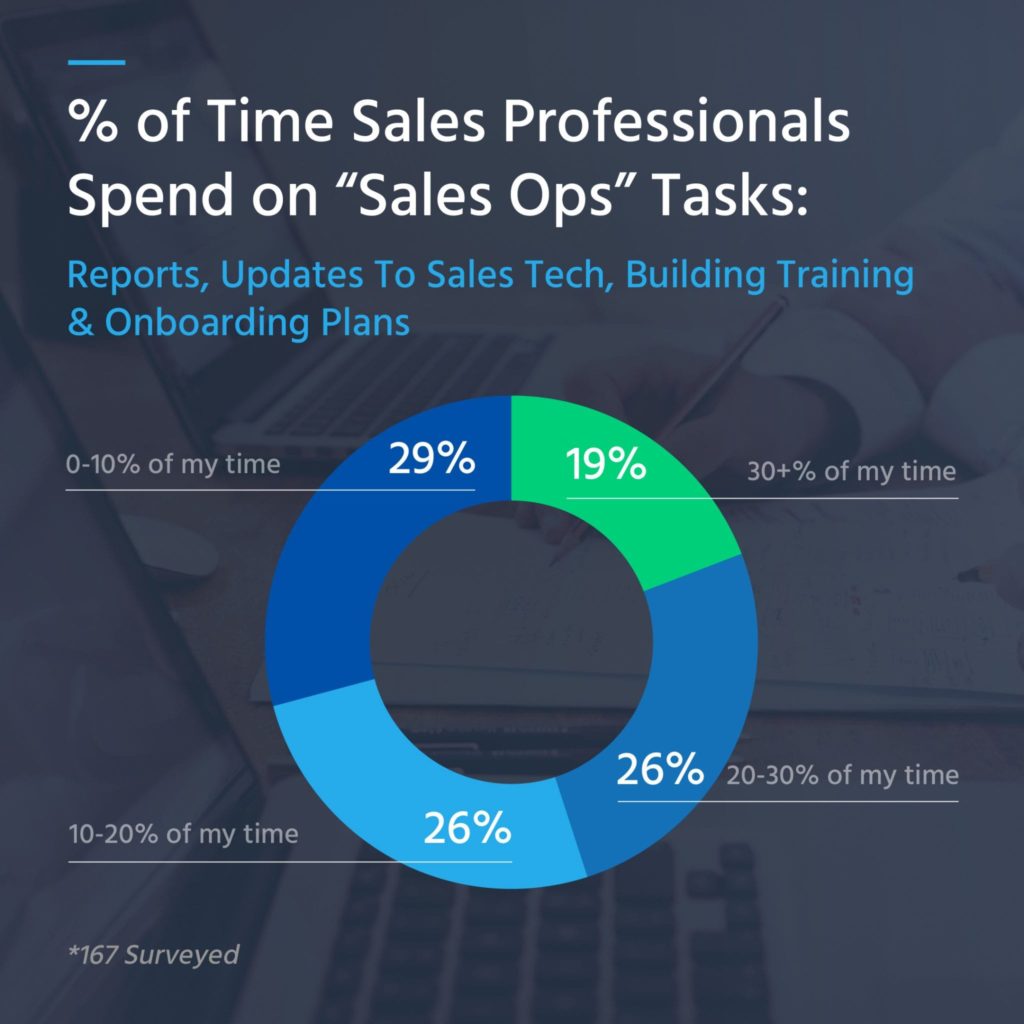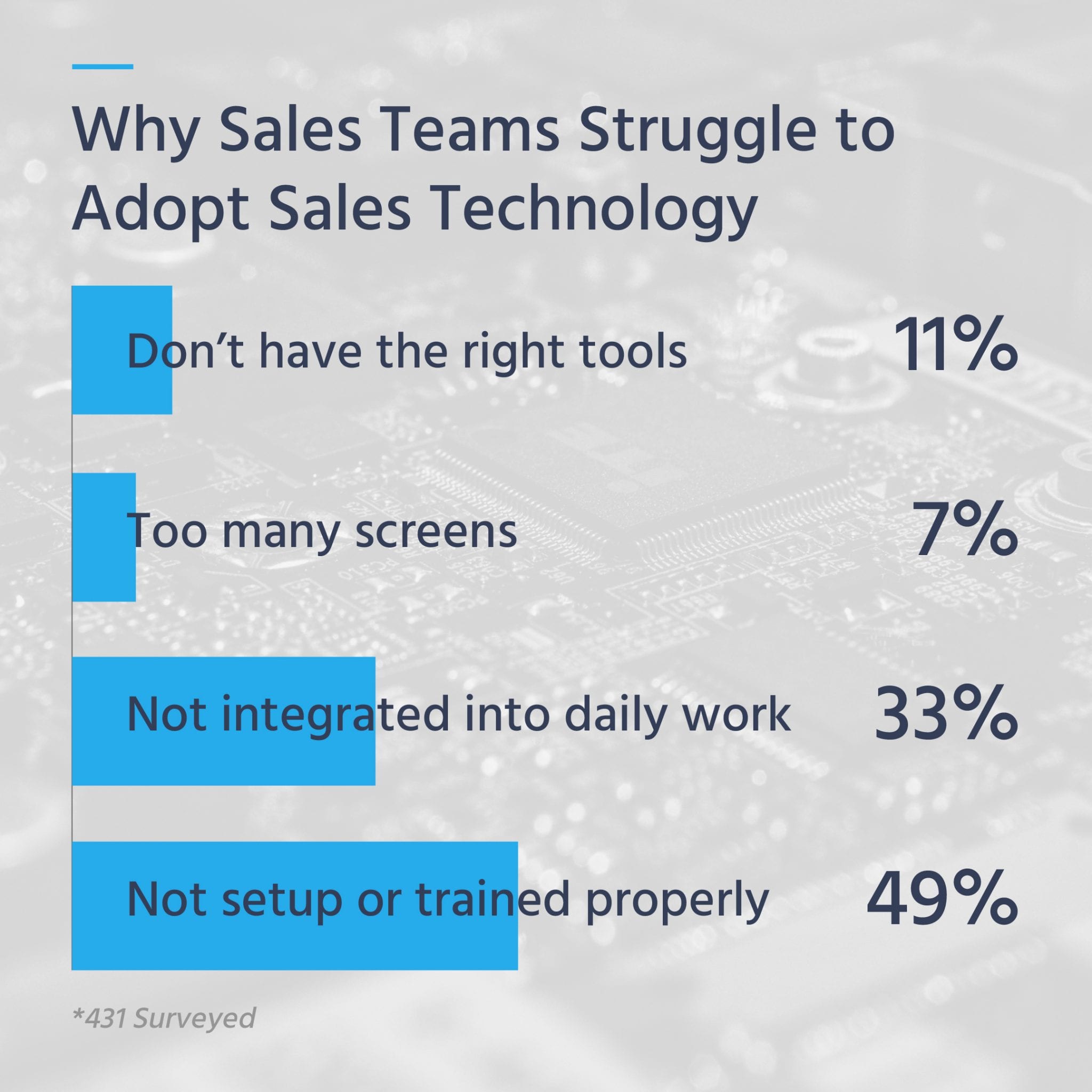
Sales Time Lost Due to Operational & Technical Task Overload
Becca Eddleman
If you ask a salesperson what they do, they’ll tell you that they sell a product or service and generate revenue for their company. If you ask a sales operations person what they do, they’ll tell you that they support and enable the sales team to sell better and faster.
But when we look at a typical sales rep’s daily tasks, we’ll see that they only spend 32.5% of their time actually selling (i.e., revenue-generating tasks).
For a number of reasons, 67.5% of a salesperson’s time is spent elsewhere.
On average, about 15% is spent on administrative or operational and technical tasks, most of which should (1) not be performed by a seller, and (2) should be operationalized and automated.
So we ran our own survey of over 600 professionals asking 2 questions about Sales Ops related tasks and sales technology:
-
- How much time do you spend doing Sales Ops tasks? (Reports, updates to sales tech, building training and onboarding plans)
- Why do teams struggle to adopt Sales Technology?
But before we dive into the results and problems associated with each question, let’s start with what Sales Operations does and how this group of experts helps Sales teams spend more time selling.
What does Sales Operations do? & How They Remove Sales Time Lost
The exact makeup and function of a Sales Ops team can vary from business to business, but the point we’re trying to make in covering what Sales Ops actually does before diving into the time spent by salespeople on non-revenue generating tasks is to show many of these operational or technical tasks taking up a seller’s time should be under the hat of Sales Operations.
Some of these tasks may include:
-
- Reporting, data analysis, and updates and forecasting
- Lead management: logging leads and moving them from one stage of the pipeline to the next, and creating any tasks that should be associated with that move
- Updating sales tech: integrating, updating, or creating workarounds that aren’t efficient but get the job done (this one’s the worst)
- Data management and cleanliness
- Building training and onboarding plans
The whole purpose of Sales Operations is to help Sales be more efficient and effective – at the process and strategy level and at the rep level.
If we do some elementary math, a ten-person sales team spending 15% of their time a week on sales ops related tasks compounds to about 60 hours a week on non-revenue generating tasks and about 240 hours a month.
Take that 240 hours and apply it to prospecting and prospect meetings and calculate how many more meetings set, deals won, and revenue you could be generating month over month… and well, you get the importance of Sales Operations when it comes to Sales time lost and its correlation to revenue.
And this is only one area where Sales Ops improves business outcomes and makes the sales team more efficient.
% of Time Sales Professionals Spend on “Sales Ops” Tasks
Reports, updates to sales tech, building training, and onboarding are all tasks and automations that salespeople shouldn’t be focusing on.
At the beginning of this article, we talked about how the group of people actually doing the selling spends about 15% of their time on these types of tasks, according to research by Xant. Another study by Salesforce showed that administrative tasks take up 25% of sales reps’ time.
Our survey calculates this time from varying levels of sales professionals and people connected to revenue from SDRs to senior leadership.
We’re not surprised at what we found.

By our numbers, 52% of respondents spend anywhere from 10-30% of their time on operational and technical tasks. Both the Xant and Salesforce surveys being somewhere in between.
Let’s look at this data one level deeper and analyze each of these groups’ majority titles. We can see how operational and technical tasks affect different levels of seniority and leadership and not just frontline sellers.
The 0-10% Group
40% Senior Leadership (Directors, VPs, CXO)
16% Mid-Level (Mangers)
28% Frontlines (SDRs, AE, AM)
16% Other
The 10-20% Group
30% Senior Leadership (Directors, VPs, CXO)
36% Mid-Level (Managers)
24% Frontlines (SDRs, AE, AM)
9% Other
The 20-30% Group
34% Senior Leadership (Directors, VPs, CXO)
11% Mid-Level (Managers)
38% Frontlines (SDRs, AE, AM)
17% Other
The 30+% Group
33% Senior Leadership (Directors, VPs, CXO)
25% Mid-Level (Managers)
34% Frontlines (SDRs, AE, AM), 25% Mid-Level (Managers)
8% Other
Why Sales Teams Struggle to Adopt Sales Technology
When people hear the term sales operations, many think of sales technology. This is another function of what sales operations does that has a sales time lost component associated with it.

The whole point of technology is to make our lives easier and increase productivity, but when it’s not implemented correctly, goes unadopted by the team, or people get a lack of training, it has the opposite effect.
When we asked sales professionals and leaders in this second survey why they struggled with adopting sales technology, this is what they said:

“Not setup or trained properly” obviously takes the win when it comes to adoption at 49%, and “Not integrated into daily work” as a close second – which we could also chalk up to poor setup and lack of training in most cases.
One of the most frustrating things a seller has to deal with is technology.
Technology that is supposed to improve their productivity but slows them down.
Technology that is supposed to give them insights into their process and deals but is pulling incorrect or convoluted information.
The benefits of Sales Operations in this scenario is a no-brainer as well. They are the experts in not only setting up sales tech and training reps on how to integrate it into the sales process. They are the go-to for pulling insights around the process and analyzing deals and data to make reps more productive and potentially shorten sales cycles.
Ready to Increase Sales’ Time Spent Selling?
These operational tasks, technology setups and training, process optimization, and data analysis are a few areas where Sales Ops experts eliminate barriers for Sales and increase their time spent selling.
The stats don’t lie. Putting sales ops related tasks on sellers’ shoulders and poor training are still big issues in sales, and they’re preventing teams from meeting and exceeding the goals.
Contact Skaled for a detailed assessment of your current organization and a strategy and sales operations expert to rapidly optimize your sales time lost and get your reps set up and up to speed on the tools they need to sell.